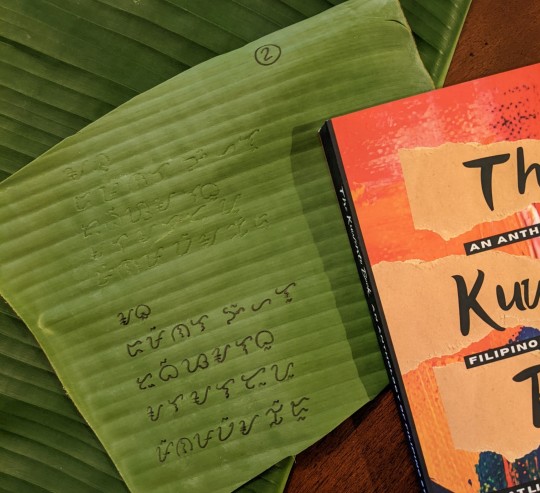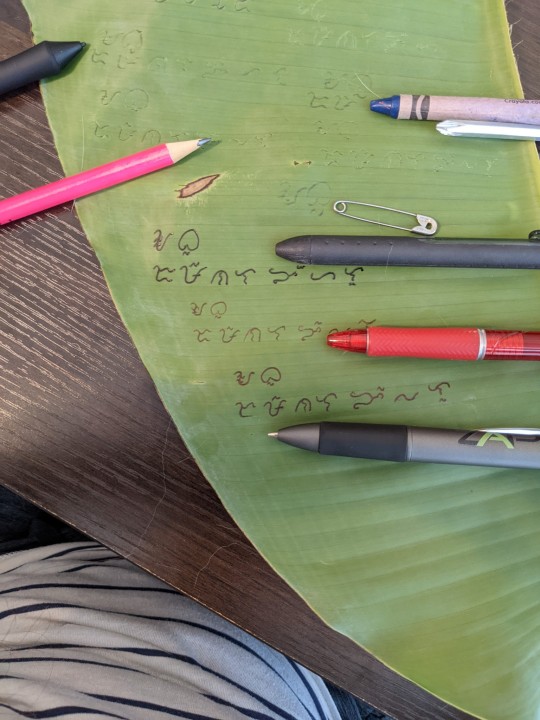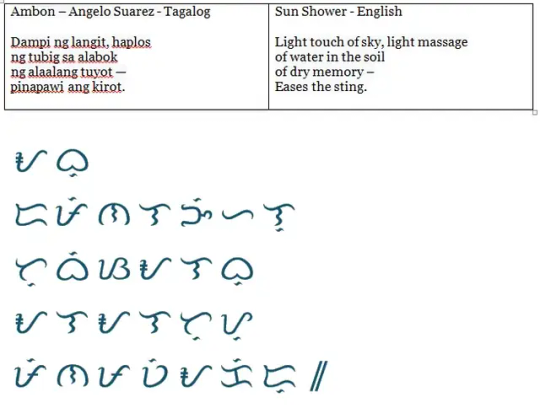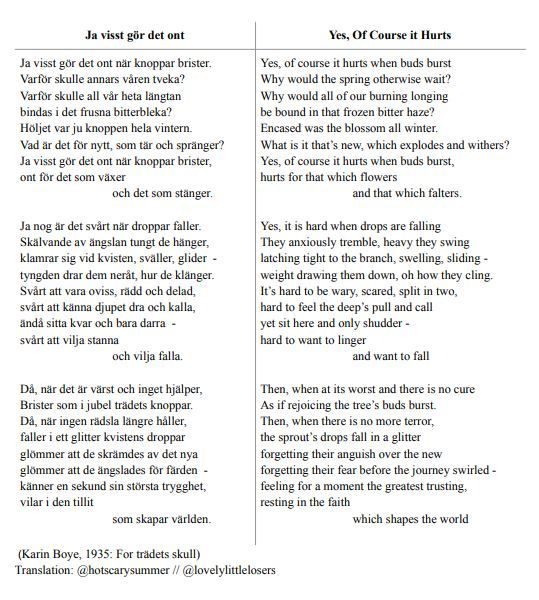#poetry translation
Explore tagged Tumblr posts
Text
This is entirely copied from my reblog of this post, but I just thought I'd put this in a post of my own for safekeeping on this hellsite or I'd literally never find the translation of Xingnv's Lament I did for this reblog ever again but. Anyway!
Whenever I think about the fact that like, people claim historical people grieved less about child and infant mortality I want to start biting because here's the translation of the Cao Zhi's poem on losing a daughter (yes the Cao Zhi of the infamous bean poem/Seven Step Quatrain fame) written sometime in the 200s AD: 行女哀辞
序:行女生于季秋,而终于首夏。三年之中,二子频丧。 伊上帝之降命,何修短之难哉;或华发以终年,或怀妊而逢灾。 感前哀之未阕,复新殃之重来!方朝华而晚敷,比晨露而先晞。 感逝者之不追,情忽忽而失度。天盖高而无阶,怀此恨其谁诉!
Xingnv's Lament
Preface: My youngest daughter, Xingnv, was born in late autumn and died in early summer of the following year. In just three years, two beloved daughters died one after another. The heavens grant precious life to people, yet why is the length of that life so hard to guess Some people are fortunate to live to old age, others die young in the womb I have yet to finish grieving for Jinhu*, yet I have to see Xingnv** buried in dust This poor child falls like the hibiscus, life drying like the morning dew I thought of that young life that could never return, and lose my normal composure Resenting that the heavens have no stairs for me to climb, to pour out the sorrows of my heart
*Jinhu is the first child that he mentioned
**Xingnv is the daughter he dedicated this poem to
Like! DESPITE what people will tell you people often grieved their children, yes, even daughters which, historical fiction SO often say that fathers hated having Girl Children or whatever. We only know Cao Jinhu and Cao Xingnv's names because their father wrote them down. And grieved their absence.
"Resenting that the heavens have no stairs for me to climb" is SO bleak and so utterly fucking devastating.
121 notes
·
View notes
Text
Am I learning baybayin calligraphy to test a book theory for 1 historically accurate throwaway detail in SAINTS OF STORM AND SORROW? 🫣 Maybe?
And maybe I just spent 3 hours collecting banana leaves from a condemned apartment building, finding Tagalog Tanaga poems that fit thematically with my novel, SAINTS OF STORM AND SORROW translating the tagalog into baybayin symbols then testing writing implements and copying out 4 different sheets to be stored in different environments to test the long term legibility of said poems 🤣 that's also possible!
But in my defense nowhere on the internet was willing to tell me more than the Wikipedia single paragraph of yes South East Asia and the Philippines used banana leaves as a writing surface pre-colonization. So really this was for science. I will likely be writing up a full blog post detailing my recent adventure into historical recreation and banana leaves, once I've finished using all my extra banana leaves to make suman 😋
Happy Filipino American History month 🇵🇭



#baybayin#tagalog#filipino#poetry#Filipino history#writeblr#writing research#calligraphy#banana leaves#science#filipino fantasy#filipino author#poetry translation#FAHM
145 notes
·
View notes
Text
A poem that never wished to be written
If you asked it – which is absurd – it wouldn’t say anything or bat its eyelashes in wonder Because eyelashes were attributed to it – long, gently curved, like those from a beauty salon – Nicole Weiß (© 2024) Translated from the German original (which can be found here) by Johannes Beilharz.
23 notes
·
View notes
Text
Kipling arrives at the sensible anti-Communist position held by all reasonable men from an odd angle: He's apparently in favour of the Czars. I think it's fair to say that this is now an unusual position even among people who would have backed the White armies as a lesser evil against the Red; considered as a regime, Czarist Russia is not recommended by anything in particular except the quality of what overthrew it. Although it is possible that Kipling sees the February Revolution as installing a legitimate constitutional government - who knows, they might even have come around on the issue of retaining a monarch? - while the October Revolution is the one that destroyed Russia entirely; the phrase "'twixt seeding-time and frost" could reasonably match that timeline. That aside, I think Kipling favours a monarch (and hereditary aristocracy) as a stabilising institution, even with a lot of power in a democratic-ish parliament; poems like "The Old Issue" and "McDonough's Song" suggest that he likes checks and balances and also tends to see the polity he was born into as the best-arranged one, as often happens.
There's no obvious connection between the Christmas carol and the poem; perhaps Kipling simply liked the repeated phrase "God rest ye… gentlemen". This was the bottleneck in the translation; I could find no Norwegian verb corresponding to the archaic English "rest ye merry" (note that it's the rest and not the gentlemen who are merry, although in Kipling's version it's presumably the gentlemen who are peaceful), and "gentlemen" is also a difficult one to render into Norwegian, especially with the scansion constraint. I ended up going from verb to noun, "God rest ye" to "God's rest", and once I had that everything else flowed easily.
The images are propaganda and photographs from the Great War and the Russian Civil War, with an occasional nod to Napoleon and WWII. The thing about Kipling's repeated "what next" is, of course, that with respect to Russia he was perfectly correct, as demonstrated by the repeated appearance of Stalin illustrating a text that cannot well have imagined him. Specific comments:
"God rest you" - four images of victory celebrations; presumably premature ones in Kipling's view.
"…in such a trench" - a mass grave, very trench-shaped, at Katyn.
"…to dig a nation's grave" - "The White Army retreats from Rostov".
"…no shadow, sound, or sight" - "The Burning of Moscow".
"…the shadow of a people" - Stalin's face making the cutting edge of a sickle is absolutely chilling.
"…that perish in the field" - "Fleeing Dekulakization".
"…for such a bribe to yield" - the sickle plowing the field is apparently intended as pro-Communist propaganda, but in context I must say I find it rather the opposite.
"…ashes, blood, and earth" - "Decossackization". The Communists do appear to have had a variety of de-somethingizations; Orwell commented on it.
"…shovel and smooth it all" - burial of the Unknown Soldier.
"…a Nation dead" - the graveyard at Verdun, obviously a large part of the reason why Kipling's desired intervention couldn't happen. "Us and what army?", the peaceful gentlemen might reasonably have responded.
"…your good help to fall?" - Finland and the Ukraine, as it turned out.
Guds hvile, godtfolk! Mor eder, la intet gi besvær - men, hatten av en stakket stund. De døde bæres her. Byer, hærer, utenfor alt av tallkunst eller bry og si meg, godtfolk, hva dere tror det jærtegn kan bety?
Bryt her grunn for en sliten rest som ikke holdt sin grunn. Gi dem den hvile de krever mest… og hvem tar neste blund, godtfolk, i slik en grøft sin blund?
Guds fred nu, godtfolk! Hvil her trygt! Men - slipp oss dog forbi. Et land så stort som England var, skal herved settes bi. For den Trone og den Stolthet og den Ære og den Makt - tre hundre år det varte; og tre hundre dagers slakt!
Olje her til en frossen flokk som ligger i grøft og renne. Varm dem, som aldri fikk varme nok… og hva skal brenne nå, godtfolk, på slikt et bål å brenne?
Guds hvile, godtfolk! La Ham eders nattesøvn vel trygge. Av dette rike gjenstår nå ei stemme, syn, eller skygge. Unntagen de som gråter, og lys av brann og fyr; og skyggen av det folket som trampes ned i myr.
Bryt her brød for en sulten skåk som svelter plent ihjel. Gi dem mat der de tar sitt åk . . . og hvem skal gi etter nå, godtfolk, i bytte for slikt et mel?
Guds hvile, godtfolk, Han være deres munterhet et skjold! Hva kongedømme falt så raskt til aske, blod og mold? Mellom sommer og snefall, frosten kommet knapt - våpen og verge, råd og håp, navn og rike tapt!
Slipp ned, slipp ned ved hode og fot - spa jord, og jevn ut alt! Slik begraves nasjoners mot . . . og hvem skal imorgen ha falt, godtfolk, med deres hjelp ha falt?
10 notes
·
View notes
Text

Anna Akhmatova (tr. by Lau Beinahr)
21 notes
·
View notes
Text
Ja visst gör det ont // Yes, of course it hurts (poetic translation)

Ja visst gör det ont - Karin Boye (link to Karin Boye herself reading, c. 1935)
#i was writing this translation for a language symposium at my college and thought i'd post it here!#also saw a fic on ao3 in the yr tag using this as the title recently which was cool#karin boye#poetry#swedish#svenska#poetry translation#translation#my translation
32 notes
·
View notes
Text

And in my chamber at home, when there I was, alone, by myself, I would proceed straight to my mirror, my glass, To look at the way that my face seemed If it were any other than it should be Eagerly would I, if it had not been right Amended it with all my ability and might.
My amateur translation of a stanza from Hoccleve's 'Complaint', trying to preserve the original rhyme scheme. Informed by this prose translation from Hoccleve Society.
I've flipped the photo so this is the inverse of my previous post - a reflection or mirror perhaps ;) I chose the motif of scrunched bedsheets because it makes me think privacy/private selves. Practicing who you are around everyone else alone in your bedroom.
4 notes
·
View notes
Text
Odyssey - Book I, 1-10
This convoluted man you’ll tell me about, my Muse,
Did wander far and wide for years, having long since
Laid holy Troy’s most sacred citadel to waste:
He got to know the towns and mind of countless folks,
And suffered many an heartache sailing ‘cross the sea,
In strife for his own life and for his crew’s return.
And yet he did not save them, though he surely tried,
Their foolish minds did seal their final doom instead:
Those idiots ate the cattle of Hyperion Sun,
And he wiped out their hopes of ever coming home.
Do tell us - please - some of that tale, ye child of Zeus!
#poetsofinstagram#poetrycommunity#poets of tumblr#poetry translation#homer#odysseus#the odyssey#hexameter
2 notes
·
View notes
Text


In Bengali they say:
Aamaay bhaashaaili re
Aamaay doobaaili re
Okool dauriaar boojhi kool naai re
Chaahe aandhi aaye re
Chaahe megha chhaaye re
Hamen tu us paar leke jaana maajhi re
Kool naai kinaar naai
Naai ko dauriaar paari
Shaabdhaane chaalaaiyo maajhi
Aamaar bhaanga tori re
Translation:
You have set me adrift
You are causing me to drown
The river seems endless as if there were no shore
Even if a storm comes, or clouds cover the sky, please carry us to the other shore dear boatsman
No border, no shore
The river has no limits
Steer it most cautiously, boatman
This boat of mine with a broken rim
https://youtu.be/FnDmg-cBVsA?si=VRC47PAAE-b4o1BV
#urdu literature#bangladeshi#bengali#urdu stuff#urdu poetry#literature#literary quotes#aesthetic desi#hindi shayari#translation#poetry translation#desi tumblr#being desi#aesthetic#desi aesthetic
4 notes
·
View notes
Text
Revising a poem translation I did last year and... god, I HATE translating poetry 😭
I mean, it's fun but
Translating from Tagalog* whose sentence structure (V-S-O) is different from English (S-V-O) is HARD. It makes the original enjambment difficult to keep. I am so tempted to make the lines end-stopped, but who am I to decide how the lines should be cut?
Moreover, the enjambed lines, I just realized, add a sense of perturbation to the persona, whose words in the poem sound completely calm and rational. And I love that because it keeps the delicate balance of intimacy and distance in this poem intact. Removing the enjambment will be reducing the persona to a cold, calculating person.
There's also the matter of what verb tense and aspect to use!
Each Tagalog verb has three basic finite forms which are often referred to as past tense, present tense, and future tense. But this labeling is misleading. The “present tense” form could be used as a past progressive (“She was singing the Ave Maria when I arrived”) as well as a present progressive (“She is singing the Ave Maria”) or present habitual (“She sings the Ave Maria beautifully”). Similarly, the Tagalog “past tense” form can be used like the English simple past (“she sang”) present perfect (“she has sung”), or past perfect (“she had sung”).
�� Analyzing Grammar: An Introduction by Paul Kroeger
And oh, don't even get me started on active vs passive voice...
----
*Not using the term “Filipino” because this poem really is only written in Tagalog. There's a difference between the two, and not just politically
#translation#literary translation#poetry translation#poetry#english#tagalog#linguistics#miyamiwu.tl#miyamiwu.src
6 notes
·
View notes
Text
Best Haiku by Bashō
Original:
Furu ike ya
kawazu tobikomu
mizu no oto
Translation by Lafcadio Hearn:
Old pond — frogs jumped in — sound of water.
Check out this site for some different translations 🐸 (art below by Matsumoto Hoji)

#godzilla reads#haiku#poetry#poetry translation#Japanese haiku#japanese poetry#frog haiku#matsuo basho#book blog#booklr#bookworm#reading
10 notes
·
View notes
Text

Translating In Memoriam, image from mtmte #41
请在我灯火昏黄不定时伴我身旁,
当热血踟蹰,当神经不安的
刺跳,在心病之时,
在万物的回转都缓慢的时刻。
请伴我身旁,当我善于感受的躯体
在巨响中摧残零落,当信任失去光华;
和时间,一个散布灰尘的疯子,
和生命,一个喷吐怒焰的妖鸟。
请在我信仰干涸时伴我身旁,
当人如晚春的飞蝇,
产卵,蛰刺,歌唱,
作出他们美丽的小屋,然后赴死
请在我生命淡去时伴我身旁,
来定下人类挣扎的尽头,
和生命黑暗低沉的边缘上
永恒白日的微光。
阿尔弗雷德·丁尼生
——《悼亡》
tbh I'm not planning to do poetry this early in my translation exercises, but mtmte quoted this one and it's a good poem.
"be near me" has a beauty in itself.
#transformers#mtmte#lin's translation log#translation#poetry#I still like the English version better uhh it rhymes#I can't keep the rhymes for my life#但我还是挺喜欢中文里一些小措辞的#chinese#poetry translation#alfred tennyson
2 notes
·
View notes
Text
I return to Housman with poem 27 of "A Shropshire Lad", a short meditation about life going on. Which is perhaps less comforting if you're the one it's going on without; such is life, as one might say. As in "Queen of Air and Darkness", Housman's very short text makes me imagine a vast swathe of backstory: Was there a love triangle here before it conveniently collapsed with one point's death? Just how grief-struck was the woman, anyway? The dead man's question implies that she wept nightly at some point, but presumably he did not personally observe this.
I had some difficulty finding reasonably thematic images in a consistent style, which is why "used to plough" and "never ask me whose" are AI-generated. The state of the art seems to have advanced immensely since the last time I used image generation, for "Battle Hymn". Both of these are zero-shot, no infill or repeated tweaking of the prompt, except that "England 1900" gave me an upper-class interior on the first attempt which didn't quite have the vibe I was looking for; specifying "a forest in rural England" fixed the background.
No particular comments on the text this time, except to note that I have faithfully reproduced the infelicity of "used to drive / and hear the harness"; perhaps this is intended as a dialect form? It's an odd transition in received-grammar English.
7 notes
·
View notes
Text

The Guest Anna Akhmatova (tr. by Lau Beinahr)
6 notes
·
View notes
Text
Lord Byron—To Thyrza, lines 1-12 (English->German)
From the tragedy portion of my translation portfolio (linked). (The comedy portion is still in the works.)
There was a already a German translation of Byron's 'To Thyrza' [Without a stone to mark the spot] using the ABAB rhyme scheme, and since I was experimenting with rhyme and metre (and torturing the translator-poet), I decided to go with AABB instead.
Without a stone to mark the spot,
Kein Stein an jenen Ort platziert,
And say, what Truth might well have said,
Mir bleibt die Wahrheit noch bewahrt:
By all, save one, perchance forgot,
Wie du, Geliebter, jung und reif,
Ah! wherefore art thou lowly laid?
Begraben schon, ‘ne Leiche steif.
By many a shore and many a sea 5
Von weitem haben wir uns geliebt,
Divided, yet beloved in vain;
Egal, dass uns das Meer getrennt.
The Past, the Future fled to thee,
Zu Asche wurdest du, zu Staub,
To bid us meet—no—ne’er again!
Auf ewig—ohne mich—im Grab!
Could this have been—a word, a look,
Gäb’ es ein Zeichen, Blick noch Wort,
That softly said, “We part in peace,” 10
‘Nen Abschied vor der Reise fort,
Had taught my bosom how to brook,
Dann wüsste ich zu atmen noch
With fainter sighs, thy soul’s release.
Und ruhiger käm’ der Tränenausbruch.
#literary translation#translation studies#now that some time has passed I need to actually finish the translator's notes and essays#and determine any additional changes to make to the actual translation#lord byron#romanticism#german#english#poetry#poetry translation#polyglot things#to thyrza
3 notes
·
View notes
Text
The Battle Hymn of the Republic is probably most familiar as music; but in translating it I found that it is really excellent as poetry. Consider that famous phrase, "the grapes of wrath"; it is a dead metaphor now in English, killed by overuse out of its original context. Seeing it with the fresh eyes of a different language let me appreciate the power of the image: The grapes of wrath, from which are made the wine of wrath - heavy on the tongue, hot in the belly, a fire in the blood; the wine that soldiers drink before battle, that makes them charge the cannon's mouth. It's a phrase anchored in physicality, if you don't slide right past it through familiarity; "He is trampling out the vintage" - I am pleased that in Norwegian I was able to add an additional verb here, "han har trampet ut en årgang og av vredens druer smakt". I don't know if Mrs Howe had drunk of the wine of wrath herself; but when she wrote that, she'd surely had a glass or two of the mead of poetry.
I have dropped the refrain "Glory, glory, hallelujah", which relies for its best effect on being sung by several hundred deep male voices marching down a dusty road with a battle at its end; it is fine music but does not really contribute to the poetry of the words alone. I've kept, however, the concluding "…is marching on" that punctuates each verse, making it "…er i anmarsj", slightly archaic Norwegian that fits well with the religious imagery. This turned out to be the most difficult part to illustrate, in a poem in which I struggled much more with the images than the words; in the end I gave up on getting any sort of metaphor for "truth marching on" through StableDiffusion, which I used for the triple-alpha rhymes, and instead put in contemporary paintings and drawings. At any rate this serves to mark the refrains as distinct from the main verses.
The final line, which Howe wrote as "let us die to make men free", is now often sung as "let us live to make men free", presumably on the theory that dead men do not actually accomplish very much and the real goal is to make the other side's soldiers die for their cause. The argument has undoubted force. On the other hand, so many of the men who sang these words in deadly earnest genuinely did die to free the slaves; died by the hundreds of thousands, by bullet and canister and cholera. My translation, somewhat unfortunately, avoids the difficulty entirely with "menns frihet er vårt krav"; the triple-alpha rhyme scheme is a cruel master here, and I could not find any way to work in either life or death.
Jeg har sett med egne øyne Herren komme i sin makt; han har trampet ut en årgang og av vredens druer smakt. Han har sluppet asgardsreien løs og lyn fra sverdet brakt. Hans sannhet i anmarsj!
I hundre vaktmenns leirbål har jeg sett ham klar til kamp; de har reist for ham et alter her i aftnens røk og damp; en rettferdig dom jeg leser, og jeg hører bødlens tramp: Hans dag er i anmarsj!
Jeg har sett hans skrifter flamme i stål og krigersk mot: ``Forakt skal dere hevne, og jeg tilgir deres bot''; la helten, født av kvinne, knuse slangen under fot, For Gud er i anmarsj!
Vi har hørt trompeten kalle, det blir aldri mer retrett; han veier alles hjerter, for hans domstol er vi stedt; Vær rask, min sjel, å svare ham; føtter, vær beredt! Vår gud er i anmarsj!
Han ble født i liljens skjønnhet langt der borte over hav; i hans bryst var det en glorie som hver enkelt nåde gav. Han døde for menns synder, og menns frihet er vårt krav! For Gud er i anmarsj!
#wait I didn't actually post this thing?#dignobbit!#rescued from the drafts folder#poetry translation#english to norwegian#battle hymn of the republic#republikkens krigshymne#julia ward howe
23 notes
·
View notes